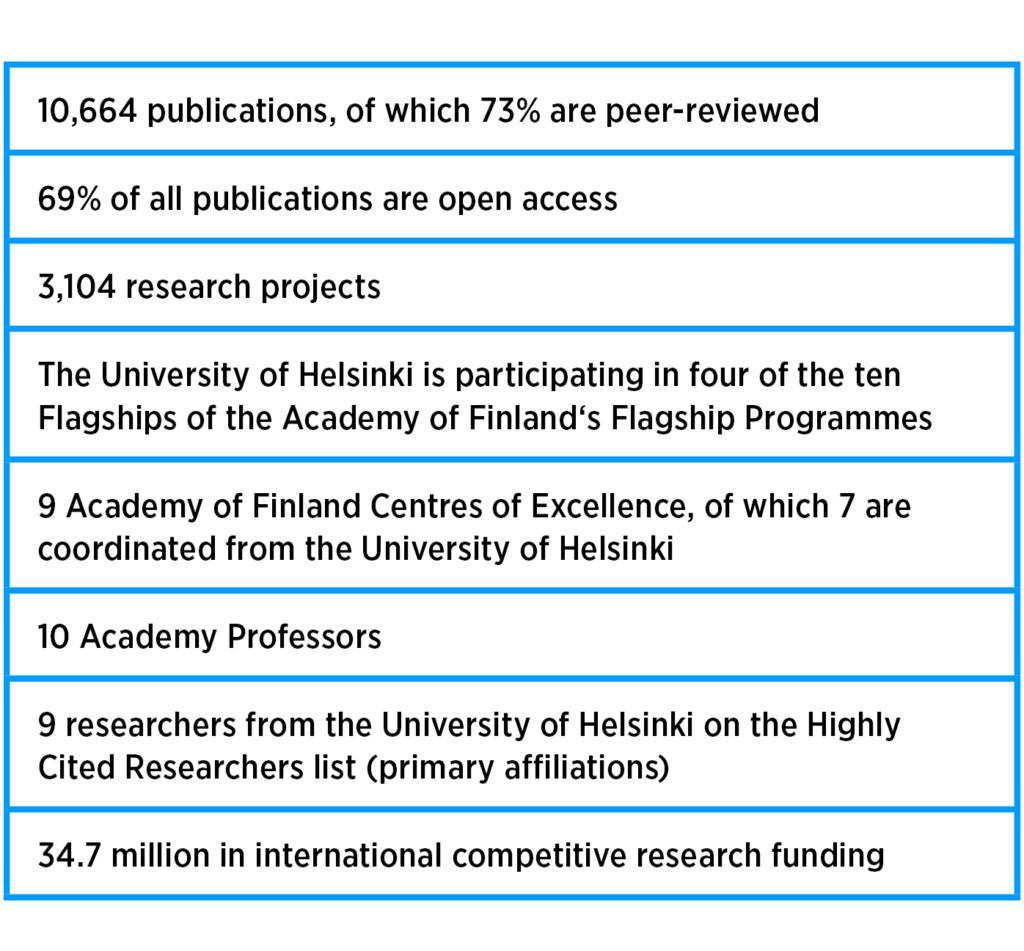Research at the core of the strategy and driver of societal engagement
The University of Helsinki positions itself as a research-intensive university and research is placed, along with teaching, at the core of its strategy. The ambition to contribute to reforming society is central to the strategy, and this is particularly present in the selection of the four interdisciplinary themes. The targets are also clearly defined in the ‘Where will we be in 2030?’ statement and specified in the four-year implementation plans.
As described in the previous section, there is a clear process in place which very much relies on the faculties/units setting their own strategy-related targets and actions. The process takes disciplinary differences in research well into account. However, as already noted, both the follow-up and using the information collected for further improvement needs to be strengthened. Currently, the only research-linked university-level strategic follow-up indicator is ‘High-quality and international open-access publications’.
On the other hand, as noted in the SAR, the impact of the university’s research is evaluated externally as part of the Research Assessment. The Research Assessment 2018–2019 evaluated all units on three criteria: scientific quality, research environment and unit viability, and societal impact. The coherence of the approach, placing societal impact in the evaluation and in the strategy, is to be commended. The systematic collection of information on impact at six-year intervals is rather slow. A more frequent and systematic way of collecting information on the societal impact of research activities would reinforce the societal engagement and impact policy of the university.
Research ethics and responsible conduct of research are central
The University of Helsinki is committed to the Finnish National Board on Research Integrity (TENK) guidelines. The university has also issued ethical guidelines for all its members and for all activities, to which are added ethical principles specific to the activities, including research. Research ethics are assessed by the university’s own three research ethics committees, and ethical research matters are coordinated by a specialist in University Services. Training on research ethics and integrity is part of the formation of doctoral students, provided by the doctoral schools. The university could try to make sure that all doctoral students take this training at the beginning of their doctoral education.
Openness is listed as one the university’s strategic choices and priorities, and open science is firmly encouraged at the university and supported through various initiatives and services. Among these, one can point to the open science website, the open science services offered by the University Library and by University Services, the Think Open blog about open science for researchers, as well as the annual open science award since 2017. University researchers can also apply for funding from the University Library to cover publication fees. A member of the university is also leading the open science group of LERU (League of European Research Universities). The policy is monitored in the integrated management system, and the current rate of open science publication is at 80%. The audit team commends the university for these achievements. A course on open science is available for doctoral students, although not compulsory. Based on audit interviews, the priority in publishing still goes to journals with high-ranking factors that are usually not open science journals. The audit team therefore recommends the university to continue its efforts in supporting the open science policy.
Great improvements have been made at the university in supporting innovation activities and business collaboration
Partnerships with companies and external stakeholders are diverse and offer a good image of the dynamics of research at the university. The university supports them to enhance the societal impact of research, in line with its strategy. Substantial progresses have been achieved in the organisation of an innovation chain that includes several structures, such as websites for the members of the university and for external partners, Business Collaboration Services with a commercialisation unit, among others, Helsinki Innovation Services, a preincubator, and services for each campus. The university actively takes part in initiatives such as Slush to promote research-based innovations. Moreover, the university is a partner with other actors in the field of innovation such as Think Company and the SPARK Finland programme. These are remarkable achievements the university is to be commended for. Several of the staff members recognised the great improvements made at the university in terms of its innovation and commercialisation services and support available. On the other, there are still things that can be improved at the university for supporting company collaboration. According to some staff members, some internal obstacles still exist, and the overall mindset should be more open towards company collaboration.
